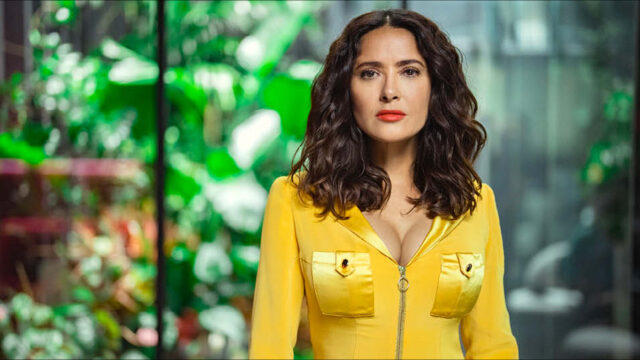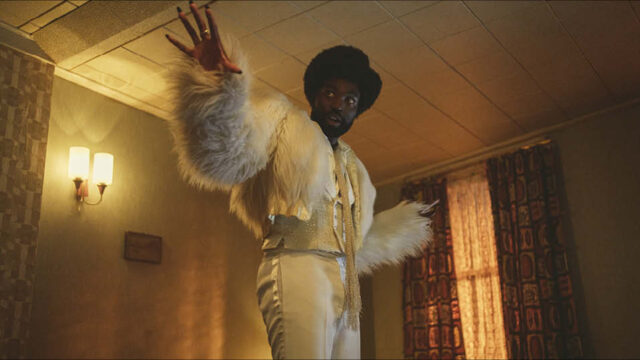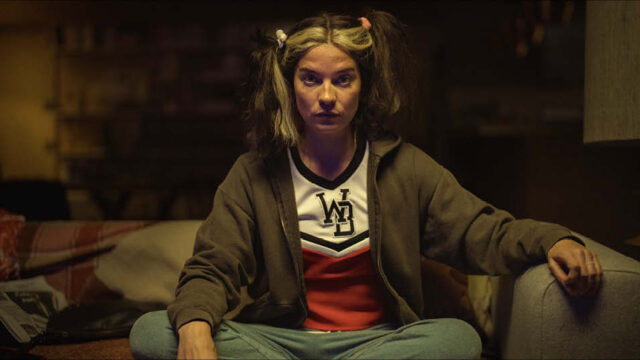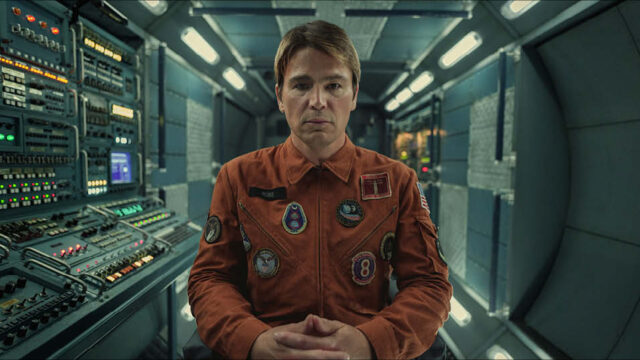Black Mirror creator Charlie Brooker and exec Jessica Rhoades tell Jon Creamer how the show’s latest season aims to confound viewers’ expectations
There’s been a little breathing space since the last Black Mirror anthology appeared on our screens 2019.
Up to that point, from its Channel 4 debut in 2011, writer and exec Charlie Brooker created a series at the rate of almost one a year across five seasons, quite a punishing schedule for a high-end drama series with completely distinct episodes that were mainly penned by a lone writer.
But, says Brooker, the four-year gap up to the latest 2023 iteration “wasn’t a deliberate pause.” For a start “there was a rights negotiation going on” after Brooker and Annabel Jones left their Endemol Shine based label and set up on their own. The rights stayed with Endemol Shine, and then new Endemol Shine owner Banijay. “So, it’s sort of chiefly that and then there was a pandemic…” and then “I was sort of caught up doing other things,” says Brooker.
Whatever the reasons for the pause, Brooker says it was in many ways a good thing “because I think that I was consciously wanting to change a few things this season.”

BACK TO BLACK
And the change has been about going back to the original essence of Black Mirror. “When I thought back to where the show started, a lot of the impetus was wanting to do something that’s a bit Twilight Zone, a bit Tales of the Unexpected, lots of variety, unpredictable and hopefully unlike anything else on TV.”
The breathing space has helped with that. “I’m not throwing shade at episodes I’ve done myself in the past but there were quite a few about consciousnesses getting uploaded into things and people wearing little nubbins on their head and their eyes milking over as they go into virtual reality.”
For the new series, says Brooker, he wanted to break away from expectations as “after a while, it starts to feel like that’s what a Black Mirror episode is or should be.”
He also wanted it to stand out from an increasingly congested crowd. “When it started, there weren’t many dystopian sci fi shows around. And now you can’t throw a smartphone across the room without hitting a dystopian future with somebody surrounded by chrome and glass and they’re crying.” So, he says, “it’s partly thinking that we’ve got to distinguish ourselves from other shows and partly from me thinking, ‘I might shake the box up a little bit.’”

GOOD TIMES
This time around, there’s supernatural horror and true crime satire mixed in with tech dystopia with the action jumping from near future to present day to 70s Britain and 60s America. “It was very liberating to think I’m going to write an episode set in the past. Why not? I’m going to break the rules because I can in this show,” says Brooker.
Dipping into period drama generated more than just variety. The episode Beyond the Sea, set in late 60s space race America, was originally an idea planned to be set in the near future. “Whenever I pictured it. It was set in 2043 and then as you slightly break your regular thought patterns and think ‘what if I just took that idea and set it in 1969? what happens then? That immediately changes quite a few things. The characters are people of their era. They’re not people of the future who’ve been staring at screens and are very modern. That was instantly really exciting.”
Brooker’s fellow exec on the show, Jessica Rhoades, points out that a period setting also allows the show “to explore some of the social elements” of those times. Supernatural horror Demon 79 takes in racism in 70s Britain and Beyond the Sea “is of a time when we still worshipped the space race and that’s what a hero was, on the front page of a newspaper that was something everyone read, and everyone knew.” Mazey Day, a horror based on the paparazzi hounding a troubled movie star is set in “literally the last moment before every human was a paparazzo, now everyone can take a picture of everyone and so those moments are unique to their period.”
“It changes the story,” says Brooker. “Once you break the rules up a little that is revitalising. It’s interesting to see if we can do a season where we don’t just rely on what people think, and what I even think, is a cliched Black Mirror episode, for want of a better phrase.”

A BOX OF CHOCOLATES
What hasn’t changed is that Black Mirror, despite being an anthology, manages to maintain a certain uniformity throughout. “It’s like when you taste something, but you can’t articulate it,” says Rhoades. But actually, “it’s the mind of Charlie.”
“What I always used to say is that the show is a box of chocolates, you don’t know what flavour you’re going to get, you don’t know what the filling is going to be but you know it’s dark chocolate,” says Brooker “There’s a flavour that does run through all of them even if, this season, we definitely stretched the variety as far as it can go short of putting in one that’s claymation.”
But that flavour goes beyond the writer. “It’s a huge collaborative thing,” he says. “If there is a unity, it’s probably because there’s a collection of similar minds looking at it throughout. But they’re all treated individually with individual directors and editors. That’s part of the fun, but also the thing that’s terrifying.”
Terrifying to produce as Black Mirror has no uniformity of cast, narrative or locations with each essentially a standalone movie. “The beauty of the show is that each episode has its own director, DoP, hair, makeup, wardrobe, AD, producer and composer,” says Rhoades. “So, there’s a beating pulse to each episode.” And each episode eventually takes on a pace of its own. “They’re going to be moving no matter what,” says Rhoades. “But I think if they weren’t charging forward on their own, it would feel oddly overwhelming. It’s five children and they’re at different ages and you’re trying to get them all to bed.”

And at some point, they have to make many of their own decisions. “Obviously, we match the director to the episodes, and I will have discussed their early reactions to the script and, and often fed in their thoughts into another draft,” says Brooker. “But for a director coming in, there’s a lot more freedom in a way than there is if you’re stepping into an episode of an ongoing show. They are encouraged to branch out, toy around, experiment and make it as individual as possible.”
And while Brooker is on hand throughout the production, “by the time we’re shooting, it is their baby. Hopefully, you can see in the finished episodes that they feel idiosyncratic. I might have come up with a lot of the stories, but they’re absolutely indelibly stamped with the mark of each individual director.”
Because those directors “are all different personalities themselves. John Crowley (Beyond the Sea) is a very calming, very thoughtful, quiet, very intellectual, warm, thoughtful presence. Then you’ve got somebody like, Toby Haynes (Demon 79) who is bubbly, enthusiastic and, he won’t mind me saying, like a boy with a play set and then you’ve got somebody like Ally Pankiw (Joan Is Awful) who is also a comedy writer and she’s got really great funny bones.” And so “it’s fun how all of that feeds into the finished article.”
But producing essentially five different movies is no mean feat. “You never have the time to get a shorthand,” says Rhoades. But at the same time “no one has the time to get bored. Everyone is coming to their episode with full passion, full intensity, full energy.” And on more traditional shows “they care every single day, but they have been working in the same set and under the same budgetary limitations so sometimes the shorthand and the ease of the economy of scale also comes with a fatigue. And here we don’t have that with our teams. We just have that with Charlie.”
Because the Black Mirror format is not an easy one to handle. “I’m constantly kicking myself,” says Brooker “Why don’t I just write a thing set in one room with four people who just chat. But part of the fun is that it’s never, ever boring. So you don’t have the economy of scale and you don’t have the continuity of character, you don’t have any of those things but also you are never bored because you’re constantly terrified.”
This article first appeared in the Summer 2023 edition of Televisual Magazine
DETAILS
Broadcaster Netflix
Production co Broke and Bones
Exec Producers Charlie Brooker, Jessica Rhoades, Annabel Jones, Bisha K. Ali (Demon 79 and Joan is Awful)
LOCH HENRY
Director Sam Miller
Written by Charlie Brooker
BEYOND THE SEA
Director John Crowley
Written by Charlie Brooker
MAZEY DAY
Director Uta Briesewitz
Written by Charlie Brooker
DEMON 79
Director Toby Haynes
Written by Charlie Brooker & Bisha K Ali
Cast Aaron Paul, Anjana Vasan, Annie Murphy, Auden Thornton, Ben Barnes, Clara Rugaard, Daniel Portman, Danny Ramirez, Himesh Patel, John Hannah, Josh Hartnett, Kate Mara, Michael Cera, Monica Dolan, Myha’la Herrold, Paapa Essiedu, Rob Delaney, Rory Culkin, Salma Hayek Pinault, Samuel Blenkin, Zazie Beetz
Jon Creamer
Share this story


















